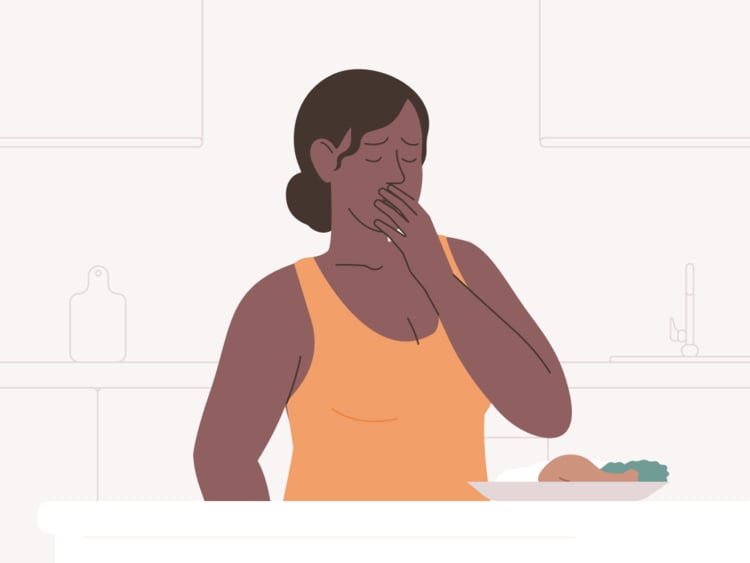We explore what’s behind period nausea and, most importantly, what you can do about it.
-
Tracking cycle
-
Getting pregnant
-
Pregnancy
-
Help Center
-
Flo for Partners
-
Anonymous Mode
-
Flo app reviews
-
Flo Premium New
-
Secret Chats New
-
Symptom Checker New
-
Your cycle
-
Health 360°
-
Getting pregnant
-
Pregnancy
-
Being a mom
-
LGBTQ+
-
Quizzes
-
Ovulation calculator
-
hCG calculator
-
Pregnancy test calculator
-
Menstrual cycle calculator
-
Period calculator
-
Implantation calculator
-
Pregnancy weeks to months calculator
-
Pregnancy due date calculator
-
IVF and FET due date calculator
-
Due date calculator by ultrasound
-
Medical Affairs
-
Science & Research
-
Pass It On Project New
-
Privacy Portal
-
Press Center
-
Flo Accuracy
-
Careers
-
Contact Us
Period nausea: What makes you feel sick during your period?


Every piece of content at Flo Health adheres to the highest editorial standards for language, style, and medical accuracy. To learn what we do to deliver the best health and lifestyle insights to you, check out our content review principles.
Feeling sick or vomiting may be among some of the worst symptoms that go hand in hand with your period. It can be super frustrating and debilitating to experience, but the good news is there are ways to treat and prevent nausea before your period. Keep reading to find out what causes period nausea and how you can help to relieve the symptoms.
Key takeaways
- In many cases, nausea during your period can be a normal reaction to the changes happening in your body during your cycle.
- There are a few possible causes behind period nausea or vomiting, including endometriosis and premenstrual syndrome.
- Depending on what’s at the root of your period nausea, there are different ways to treat it, from medications to at-home remedies.
Nausea and your period: Are the two connected?
So, is there a connection between feeling nauseous or sick and your menstrual cycle? The short answer is yes. There are several possible causes of nausea and vomiting during your periods, including:
Your body’s reaction to the release of prostaglandins, the chemical that causes the uterus to contract during your period, which can lead to cramping, nausea, and vomiting
Medical conditions like endometriosis (more on that below)
Changes in the levels of hormones that sometimes encourage overproduction of stomach acid
We’ll look at the causes of period nausea and vomiting during your period in more detail below.
Take a quiz
Find out what you can do with our Health Assistant
Is it normal?
As horrendous as it can be to experience, period nausea and vomiting before and during your period is normal. The good news is that once you’ve figured out exactly what’s causing it, you’ll be able to explore possible treatments.
What causes period nausea?
Dysmenorrhea
Nausea during your period is a symptom linked to dysmenorrhea, the medical term for painful periods. Primary dysmenorrhea is caused by chemicals in the body known as prostaglandins. Among many other things, prostaglandins help your body launch an inflammatory response to tissue damage or infection. During your period, they help your uterus contract, shedding the lining and causing your period. As a side effect, they can cause pain and nausea during your period, sometimes leading to vomiting, diarrhea, and headaches.
Secondary dysmenorrhea is caused by other medical conditions, including pelvic inflammatory disease (which you can find out more about here), but most commonly, endometriosis.
Endometriosis
Endometriosis is a condition where tissue similar to the kind that lines the inside of your uterus grows in other places. This endometrial-like tissue is often found in the ovaries, uterine tubes, and the tissue lining your pelvis. Like regular endometrial tissue, it thickens, breaks down, and bleeds when you get your period. However, this tissue has nowhere to go and becomes trapped, leading to adhesions and scar tissue that can be extremely painful. The pain is usually especially bad during your period, which is also when nausea can occur.
Premenstrual syndrome (PMS)
Nausea before your period is one of the various uncomfortable symptoms that come with premenstrual syndrome (PMS), along with abdominal pain, backache, anxiety, and mood swings. It’s unclear what causes PMS, but it could be due to the fluctuations in hormones and brain chemicals during your cycle. PMS is definitely no fun to experience, but it might be comforting to know that you’re not alone — in one study, 20% to 40% of women were found to experience it.
Premenstrual dysphoric disorder (PMDD)
Premenstrual dysphoric disorder (PMDD) is a severe form of PMS that has a number of psychological and physical symptoms. It’s rarer than PMS, affecting 2% to 8% of women.
While the exact cause of PMDD isn’t known, like PMS, it could be a reaction to the hormonal changes that happen before and during your period. It’s possible that these hormonal changes cause a deficiency in serotonin, which plays a key role in a number of bodily functions, including mood.
The symptoms of PMDD can be really tough to manage, including depression, anxiety, crying spells, acne, fluid retention, and vision changes. The condition also causes various gastrointestinal symptoms, including nausea and vomiting. So, if you’re experiencing nausea or are throwing up during your period along with other severe symptoms, PMDD could be the reason.
How is period sickness treated?
If period nausea has got you feeling down, we hear you. Luckily, there are plenty of treatment options, depending on what’s causing it.
A type of drug called prostaglandin inhibitors (nonsteroidal anti-inflammatory drugs) can help to manage nausea caused by dysmenorrhea (you’ll need a prescription, but always speak to your doctor before taking any new medications). If your nausea is caused by mild PMS that doesn’t have too much of an impact on your life, then lifestyle changes could help (more on these later). They’re also often recommended for those with PMDD.
Taking birth control pills can also help with period-related issues like nausea. Some people who suffer from PMDD (or PMS that isn’t helped by lifestyle changes) find that taking the birth control pill continuously (when you have no week off and, therefore, no “period”) makes a big difference to their symptoms. Hormonal treatments, including birth control pills and contraceptive injections, are also one of the key ways to treat endometriosis. If you think they could help you, reach out to your doctor for advice.

How to alleviate period sickness at home
If you’re feeling sick now and need a quick fix, there are several ways to treat nausea at home.
Certain dietary changes can help with nausea. Avoid fried, greasy, or sweet foods (opt for small portions of bland food instead), steer clear of intense odors, and stay hydrated.
Studies show that ginger is a great remedy for nausea, so drinking ginger tea may help calm your stomach. Taking small sips of cold, clear, carbonated, or sour drinks (like water, lemonade, and ginger ale) may also help.
If you’re suffering from dysmenorrhea, applying heat (like a hot water bottle) across your lower abdomen and physical activity may ease your symptoms.
You can also try an antacid, which can help alleviate sickness by neutralizing the acid in your stomach. Just remember to consult your health care provider before taking any new medication.
How to prevent period sickness
As we’ve seen, some women find that making lifestyle changes helps to prevent PMS symptoms more broadly. This includes things like exercising at least three times a week, getting enough sleep, eating a balanced diet, not having too much salt, sugar, caffeine, and alcohol, and not smoking. This might sound like a lot, but you may end up noticing all kinds of benefits from making just a few of these changes — so why not give it a try?
If lifestyle changes don’t help, then reach out to your doctor to discuss the treatment options (listed above) that could help.
Period nausea: When to see a doctor
Just because period nausea is normal, it doesn’t mean you have to put up with it. If period sickness is bothering you to the point that it’s affecting your day-to-day life, speak to your health care provider. They should also be your first resource if you’re considering treating the issue with medications such as hormonal medicine, like the combined contraceptive pill.
If you’re experiencing nausea and vomiting during your period and the symptoms are severe, it’s always best to reach out to your doctor so they can check you over.
FAQs
How long does period nausea last?
This depends on the cause of your period nausea. For example, if your period nausea is caused by PMS, your symptoms should disappear a few days after you get your period. Similarly, if it’s caused by dysmenorrhea, your symptoms should last two to four days leading up to and at the start of your period.
Is it period or pregnancy nausea?
Figuring out whether it’s pregnancy or period nausea comes down to timing, as pregnancy nausea usually doesn’t start until you’re at least six weeks pregnant. It’s only likely to be pregnancy nausea if you’ve also had a missed period.
Does PMS get worse with age?
It’s unclear whether PMS — or PMS nausea, for that matter — gets worse with age. However, you might find that your symptoms get worse in your late 30s and 40s as you begin the transition into perimenopause.
Does humming help nausea?
There is no scientific evidence that humming stops nausea by repressing your gag reflex. A more reliable remedy for when you’re nauseous during your period is to make some of the dietary changes above or try sipping on some ginger tea. In severe cases of nausea, a doctor or health care professional can prescribe medications to help.


Hey, I'm Anique
I started using Flo app to track my period and ovulation because we wanted to have a baby.


The Flo app helped me learn about my body and spot ovulation signs during our conception journey.


I vividly
remember the day
that we switched
Flo into
Pregnancy Mode — it was
such a special
moment.
Real stories, real results
Learn how the Flo app became an amazing cheerleader for us on our conception journey.
References
“Am I Pregnant?” Cleveland Clinic, my.clevelandclinic.org/health/articles/9709-pregnancy-am-i-pregnant. Accessed 30 Aug. 2023.
“Antacids.” NHS, www.nhs.uk/conditions/antacids/. Accessed 30 Aug. 2023.
Chumpalova, Petranka, et al. “Prevalence and Clinical Picture of Premenstrual Syndrome in Females from Bulgaria.” Annals of General Psychiatry, vol. 19, no. 3, 15 Jan. 2020, https://doi.org/10.1186/s12991-019-0255-1.
“Dysmenorrhea.” Johns Hopkins Medicine, www.hopkinsmedicine.org/health/conditions-and-diseases/dysmenorrhea. Accessed 30 Aug. 2023.
“Dysmenorrhea (Menstrual Cramps).” Cleveland Clinic, my.clevelandclinic.org/health/diseases/4148-dysmenorrhea. Accessed 30 Aug. 2023.
“Dysmenorrhea: Painful Periods.” The American College of Obstetricians and Gynecologists, Dec. 2020, www.acog.org/womens-health/faqs/dysmenorrhea-painful-periods.
“Endometriosis.” Mayo Clinic, 24 July 2018, www.mayoclinic.org/diseases-conditions/endometriosis/symptoms-causes/syc-20354656.
“Endometriosis.” The American College of Obstetricians and Gynecologists, Feb. 2021, www.acog.org/womens-health/faqs/endometriosis.
Gudipally, Pratyusha R., and Gyanendra K. Sharma. “Premenstrual Syndrome.” StatPearls, StatPearls Publishing, 2023, www.ncbi.nlm.nih.gov/books/NBK560698/.
“I Throw Up during My Period. Is That Normal?” Nemours TeensHealth, kidshealth.org/en/teens/periods-sick.html. Accessed 30 Aug. 2023.
“Morning Sickness.” Cleveland Clinic, my.clevelandclinic.org/health/diseases/16566-morning-sickness-nausea-and-vomiting-of-pregnancy. Accessed 30 Aug. 2023.
“Nausea and Vomiting.” Cleveland Clinic, my.clevelandclinic.org/health/symptoms/8106-nausea--vomiting. Accessed 30 Aug. 2023.
“Nausea and Vomiting.” Mayo Clinic, 8 Apr. 2022, www.mayoclinic.org/symptoms/nausea/basics/when-to-see-doctor/sym-20050736.
“Pelvic Inflammatory Disease.” Cleveland Clinic, my.clevelandclinic.org/health/diseases/9129-pelvic-inflammatory-disease-pid. Accessed 30 Aug. 2023.
“Premenstrual Dysphoric Disorder (PMDD).” Johns Hopkins Medicine, www.hopkinsmedicine.org/health/conditions-and-diseases/premenstrual-dysphoric-disorder-pmdd. Accessed 30 Aug. 2023.
“Premenstrual Dysphoric Disorder: When It’s More than Just PMS.” Harvard Health Publishing, 12 Oct. 2015, www.health.harvard.edu/blog/premenstrual-dysphoric-disorder-when-its-more-than-just-pms-201510128415.
“Premenstrual Syndrome (PMS).” Johns Hopkins Medicine, www.hopkinsmedicine.org/health/conditions-and-diseases/premenstrual-syndrome-pms. Accessed 30 Aug. 2023.
“Premenstrual Syndrome (PMS).” NHS Inform, www.nhsinform.scot/healthy-living/womens-health/girls-and-young-women-puberty-to-around-25/periods-and-menstrual-health/premenstrual-syndrome-pms. Accessed 30 Aug. 2023.
“Premenstrual Syndrome (PMS).” Office on Women’s Health, www.womenshealth.gov/menstrual-cycle/premenstrual-syndrome. Accessed 30 Aug. 2023.
“Prostaglandins.” Cleveland Clinic, my.clevelandclinic.org/health/articles/24411-prostaglandins. Accessed 30 Aug. 2023.
“The Best Teas to Drink for Your Health.” Cleveland Clinic, 13 Aug. 2021, health.clevelandclinic.org/teas-for-health/.
“When Should I Be Concerned about Nausea during My Period?” Tidewater Physicians for Women, 16 Nov. 2022, tidewaterobgyn.com/nausea-during-period/.




